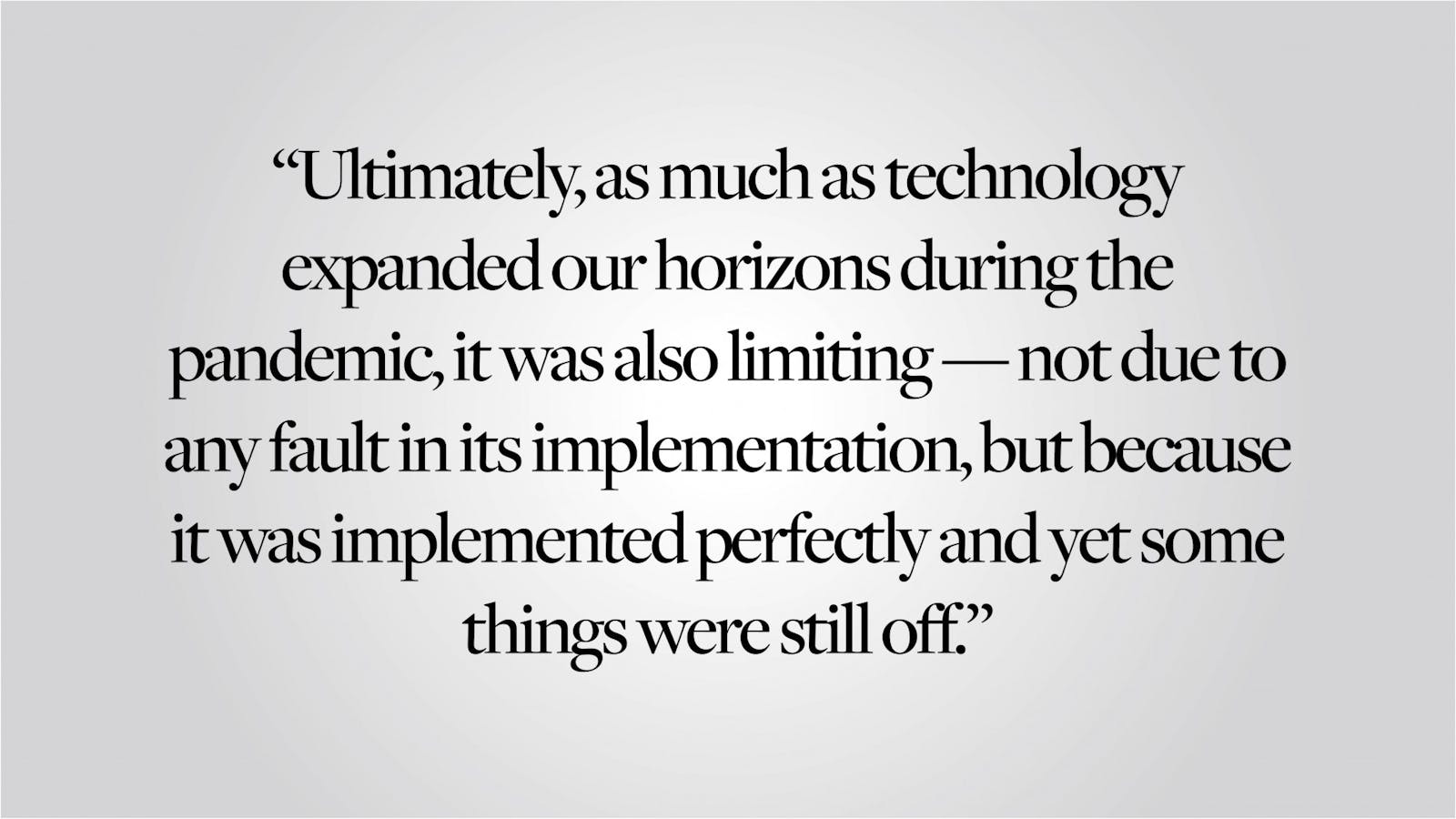
When I moved to campus for the first time in January amid the bleakest months of the COVID-19 pandemic, I felt like a normal college student in many important ways: I was struggling with newly difficult classes, making friends with my crazily impressive peers and braving a New England winter for the first time. Yet what I thought was normal wasn’t. This fall, I could finally understand what upperclassmen meant when they said that Brown felt like itself again — full of energy, vitality and life. This is clearly evidenced by the record turnouts at orientation events, the student activities fair and even Family Weekend. The same events were held last year in virtual form, but it’s obvious why the turnout was so much less then: It just wasn’t the same through a screen. Although the pandemic made technology indispensable, it also exposed the gaps that technology inherently can’t fill.
Tech companies have argued that software is only as good as its ability to make our lives more efficient. The issue is that efficiency may no longer be our top priority. Zoom was efficient, sure, but, as last year’s turnout rates show, efficiency wasn’t enough to draw people to the events. But if efficiency comes at the cost of happiness, we don’t have to ascribe it so much importance: Technology should enhance our lives, not just expedite them.
Someone might ask: Why shouldn’t we prioritize the efficiency that technology uniquely affords us? Technology has given us lifestyles that wouldn’t have been thought possible 20 years ago. Yet while efficiency is an important and worthwhile goal, we can’t think of it as our only one. Our happiness and satisfaction as people don’t come from some maximally productive lifestyle. The pandemic has shown us that we want human-centered day-to-day interactions.
The quick adoption of Zoom as a video conference platform by governments, corporations and schools enabled us to study and work from home. While this approach to replacing in-person events and activities prevented productivity from stalling as much as it could have early in the pandemic, it also sparked mental health issues for students who saw large parts of their casual daily human interactions cut off. While video conferencing platforms offer services that can give the appearance of real human connectivity, to me, they are far colder.
You can’t casually run into someone before a Zoom meeting, nor can you make eye contact with them during it or catch up with them once it is over. If you do want to engage with an individual in some capacity greater than everyone else in the meeting, you have to be awfully intentional about it — actively choosing to send a private message, pin them or email them. Especially without knowing someone well, many people just don’t have the impulse to go that extra mile. Even though technology made human connection possible through a screen during the pandemic, we lost the spontaneity and naturalness that make it so rewarding and meaningful to us in the first place.
There are countless more examples of instances where technology allowed us to go through the motions to replicate aspects of our pre-pandemic lives, but took away the spark that made them worthwhile. The readily available cameras in classrooms and even recreational spaces around Brown’s campus made the switch to asynchronous courses and tours relatively seamless — I never would have been able to take courses last fall without that resource. But as a then-first-year with no prior college experience, I can’t say that I felt like a real part of Brown or anything else bigger than my computer screen.
Ultimately, as much as technology expanded our horizons during the pandemic, it was also limiting — not due to any fault in its implementation, but actually perhaps because it was implemented perfectly and yet some things were still off. This could be a wake-up call for tech companies that primarily focus on how processes should be optimized. Now, they have the opportunity to question whether the optimization of a given process is actually what human beings want and would benefit from. We’ve reached a point where we can no longer afford a strictly pragmatic approach to integrating tech into our lives; if we push to create technologies just because they are possible to create, we will overwhelm ourselves with optimization and convenience over unquantifiable human connection. It’s not just about racing from point A to point B. Clicking “Leave Meeting” the moment the clock strikes 10:50 is no substitute for staying that extra 10 minutes after an in-person class to chat with a professor and make eye contact with that classmate.
Our preferences should determine the technology we create, rather than the technology we create determining our preferences. Although it would have been far more difficult to navigate the pandemic without modern technology, I’d be hard-pressed to say that I found “Zoom University” to be an equal substitute for the real thing. We’ve found temporary adaptations to unprecedented challenges, but the gaps that tech-based solutions haven’t been able to fill are self-evident: Just ask any student in my year. It’s clear that today’s tech companies are capable of unimaginable innovation. It is the end to which they engineer that innovation that will be key in determining how much we get out of tech going forward.
Anika Bahl ’24 can be reached at anika_bahl@brown.edu. Please send responses to this opinion to letters@browndailyherald.com and other op-eds to opinions@browndailyherald.com.
from WordPress https://ift.tt/3EQqiNc
via IFTTT

No comments:
Post a Comment